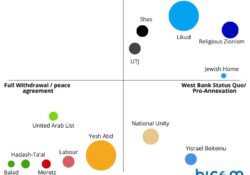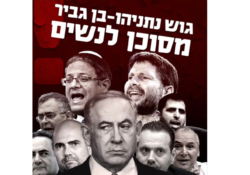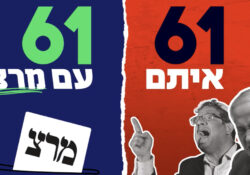Analysis
BICOM Election Special October 2022
Category:
With under a week to go before the election on November 1, and after relatively quiet summer months and Jewish holidays, the parties are deep in campaign mode. BICOM’s fourth 2022 election briefing examines these campaigns. It follows previous BICOM briefings on:
The main trends, with polling from September here
The State of the Parties, what they believe and their early campaigns here
The Collapse of the Bennett-Lapid government – what’s next here
The strength of the pro and anti-Netanyahu blocs have remained remarkably similar since the Bennett-Lapid government collapsed. In light of this. elections could ultimately be determined by which parties end up falling below the threshold, voter turnout in the Arab sector, and where the Israeli soft-right (former Likud and / or Yamina voters) choose to cast their vote.
For more on this issue, see Fine Margins and the Israeli Election – 3 Questions that will determine the elections in the Fathom Journal.
Positions on key political and security issues by party

CAMPAIGN STRATEGIES
LIKUD:
As leader of the opposition, Benjamin Netanyahu has tried to focus on critiquing government policies. Earlier in the campaign he sought to raise the issue of the high cost of living and was filmed filling up his car with petrol and discussing the price. In a recent campaign ad, Netanyahu promised free nurseries for toddlers until the age of three (children over three already have free childcare due to Finance Minister Moshe Kahlon’s policy that was passed in a previous Netanyahu government). Netanyahu has also heavily criticised the government’s handling of the security situation, especially the recent maritime deal with Lebanon which Netanyahu claimed signalled a capitulation to Hezbollah leader Hassan Nasrallah.

‘One time was enough’ says the poster with a picture of Prime Minister Lapid, Defence Minister Benny Gantz and Mansour Abbas who were part of the current coalition. Netanyahu has referred to Abbas and his party as terror supporters (although after the last election Netanyahu sought to get Abbas’ support).
Another tactic has been warning voters that Lapid will be forced to rely on an Arab party to form a coalition. At the same time, Likud has been active on social media in Arabic, spending more budget on Facebook than any other party. The goal is to reduce antagonism towards Netanyahu since Arab parties often warn against his victory ahead of elections. In these campaigns, Netanyahu argues that Arab MKs only care about themselves. He also promises to launch a plan to combat crime and violence in Arab society.
Alongside this is Netanyahu’s call to encourage those former Likud voters who stayed at home in the last election to come out and vote – Likud received 300,000 fewer votes between the March 2020 election and the March 2021 election. Netanyahu argues that only by voting Likud can Israel gain a stable right-wing government that can rule for four years.
Netanyahu faces two main dilemmas regarding parties that are natural allies. One is whether to attack or ignore Ayelet Shaked’s Jewish Home party. Much bad blood exists between the Netanyahu family and Shaked and her party is currently polling below the threshold, which would result in votes for her being lost to the ‘right wing bloc’. But if Jewish Home were to get over 3.25 per cent, it could help guarantee the pro-Netanyahu bloc reaches 61 seats. A second dilemma relates to the Religious Zionist party which is flying high in the polls. There is mounting concern that if the party becomes too strong, it would limit Netanyahu’s future political room to manoeuvre. Bezalel Smotrich has already said he would like to be appointed Defence Minister while Itamar Ben Gvir has called for himself to be Minister for Public Security. More comfortable for Netanyahu would be to shave off some support for Religious Zionist party to strengthen Likud. This will likely be his strategy between now and election day.

The 61st seat depends just on you! This time no one stays at home. Vote Likud and get a right-wing government for four years
YESH ATID:
Yesh Atid leader Yair Lapid’s has until now been primarily focused on running the country rather than campaigning. One of the party’s messages is to reinforce the suitability of Lapid as Prime Minister. Another is ‘we came to change [the policies of the country], and we will continue to change.’

We came to change. We’re continuing to change.
In this context the party seeks to list what they see as a long line of policy achievements – such as raising the salary of soldiers, forging an agreement with the teachers union, passing legislation for those with disabilities to integrate into the workforce, improving relations with Turkey, carrying out a short and effective operation against Islamic Jihad in Gaza, signing a maritime agreement with Lebanon and others. In response to Netanyahu’s charges about high prices, Yesh Atid adverts have focused on the rise in living expenses during Netanyahu’s tenure as Prime Minister.
Lapid’s campaign is trying to walk a fine balancing act in which he narrows the gap between Yesh Atid and Likud but without sending any of the smaller parties in the anti-Netanyahu bloc under the electoral threshold. It appears he is succeeding. Yesh Atid is polling in the mid-20’s up 25 per cent since elections were declared, and Meretz and Labour still both polling at 5 seats. However, if this were to change it would be a significant blow for the anti-Netanyahu bloc.
Lapid has also tried to encourage higher voter turnout in the Arab sector without being overly criticised by the right wing. The Prime Minister recently gave interviews to Arabic language media outlets in which he touched on a range of issues, including violence in Arab society, the housing shortage and racism Arab society has suffered at the hands of Israeli governments. Lapid reiterated his support for ‘two states for two peoples’ and said he would not rule out forming a coalition that relied on Hadash and Ta’al. Lapid is also expected to give interviews to all Arabic-language media calling on people to get out and vote. Low turnout in the Arab community will significantly raise Netanyahu’s chances of getting a coalition of 61.
One focus of the campaign has been amongst women, with videos highlighting the dangers of a Netanyahu-Ultra-Orthodox-Smotrich-Ben Gvir coalition.
 The Netanyahu bloc is a danger to women
The Netanyahu bloc is a danger to women
THE RELIGIOUS ZIONIST PARTY:
The Religious Zionist Party’s new campaign to “fix the justice system and to strengthen democracy”. Its focus is on abolishing the crime of fraud and breach of trust (of which Netanyahu is accused in his corruption trial) and changing the composition of the Judges Selection Committee to give greater power to elected politicians. The plan has been heavily criticised by centrist and left-wing parties with Meretz Chairwoman Zehava Galon describing it as “conversion therapy for the justice system… and an attempt to carry out a regime coup” and Gideon Saar of the National Unity party saying the plan was meant to politicise the justice system and destroy its ability to fight governmental corruption.

The party’s campaign has emphasised personal security for citizens and that it will be able to help protect Israel against its enemies. One billboard used one of the many prayers over the Jewish New Year – that God should get rid of our enemies – alongside the pictures of three MKs from the Hadash-Taal party – Ayman Odeh, Ahmed Tibi and Jewish MK Ofer Casif. It then adds that ‘it’s time for [Itamar] Ben Gvir.’ For more on the increasing popularity of Itamar Ben Gvir see this Fathom essay.

Another campaign message focuses on you get what you vote for. In other words, in contrast to the allegation that Naftali Bennett and Ayelet Shaked deceived their (predominantly right-wing) voters by joining a ‘left-wing government with terrorist supporters’ (i.e. Mansour Abbas’ Ra’am party), a vote for Religious Zionist is a pure right wing vote.
THE NATIONAL UNITY PARTY:
The National Unity Party has thus far failed to gain altitude in the polls with the merger between Gantz and Saar, as well as recruiting popular former Chief of Staff Gadi Eisenkot not yet providing the party with the momentum it had hoped for. Indeed, the party is currently polling at a number less than the sum of their parts.
That stagnation in the polls has been detrimental to the party’s central campaign message, which presents Gantz as being the only candidate who is able to form a government because he is allegedly acceptable to the Ultra-Orthodox parties and able to peel them away from the pro-Netanyahu camp in a way that Lapid is not.
Gantz has tried to present himself as a statesmanly candidate that can build bridges and form coalition of over 70 MKs after the election. In an interview with Ultra-Orthodox newspaper Kikar Hashabat, Gantz said, “We are the only ones creating a stately, political bridge in the State of Israel. We are the political solution. Shas sat with Meretz in the past, Lieberman [of Yisrael Beitenu] sat in the past with the Haredim. I know Lieberman; the man fasts three times a year, his room is filled with books, I don’t think that in his soul he isn’t Jewish.” Yet with low polling numbers, the party will find it difficult presenting Gantz as someone who can form a government.
The party has also launched a campaign focusing on the range of security challenges facing Israel, including crime in the south of the country. The underlying argument is that both Gantz and Eisenkot have the security experience and expertise during such volatile times.

Either Gantz now or Bibi returns
UNITED TORAH JUDAISM AND SHAS:
The ultra-Orthodox Shas party has been polling consistently at 8 seats over the last three months.
Its main campaign focuses on the cost of living. According to Shas the Bennett-Lapid government caused a rise in prices on many goods, which has made life difficult for poorer families. What is needed is a traditional, socially-aware party such as Shas that – together with other parties in the pro-Netanyahu bloc – can provide stability for the country.
In depth polling suggests apathy exists amongst traditional UTJ supporters. Some ultra-Orthodox men who have jobs feel the party no longer represents them. Moreover, the authority of Rabbinical courts over their followers has eroded.
Despite friction between their constituent parts, they appear to have stabilised support among the ultra-Orthodox Ashkenazi community by reinforcing their image as the defenders of their traditional values.

852,000 Children are ‘Hungry for Change’. Other posters in the ‘Hungry for Change’ series refer to 200,000 elderly and 500,000 families.
YISRAEL BEITENU:
Yisrael Beitenu’s main campaign messages are that Avigdor Lieberman has been a responsible Finance Minister and that only a strong Yisrael Beitenu can help block influence of the ultra-Orthodox parties. Lieberman has been an outspoken advocate of the need for ultra-Orthodox schools to teach core subjects such as mathematics and English if they want to receive state assistance (controversially Netanyahu promised the ultra-Orthodox parties that they would get the money regardless).

Lieberman: Any institution that does not teach core subjects will not even receive a shekel from the state budget. This will be a condition of ours in the coalition agreements”.
Yitzchak Goldknopf. Head of UTJ “I didn’t notice that mathematics and English economically advanced the state.”

Lieberman: ‘Free Economy – Free Country’
LABOUR AND MERETZ:
Both Labour and Meretz are trying to stave off losing voters to Yesh Atid. Zehava Galon has tried to argue that what matters is not the size of the largest party but rather the size of the ‘bloc’. Based on this argument, it doesn’t matter if Lapid gets 20 or 25 seats. What matters is that Meretz passes the threshold and is strong.
Both parties have also emphasised their liberal values. Labour leader Merav Michaeli has talked up her planned social oriented policies. In a campaign speech she promised to lower housing prices, to significantly raise the minimum wage, to allow public transport to run on Saturdays, to promote civil marriage, and to increase the old age pension and peg it to the average wage. Galon described Meretz as a social democratic party that fights for equality. Both parties have vowed to pass the ’Defendants Law’ which prevents someone charged of corruption for becoming Prime Minister.
Mentioning former Prime Minster and Labour leader Yitzchak Rabin, Labour has called for Israel to reach an agreement to resolve the Israeli-Palestinian conflict and to create a political horizon. Michaeli referred to Rabin as embodying the capacity to go from being a soldier and IDF chief of staff in war to being a soldier in the army of peace. She also talked about the need to protect important values at risk – from violence, racism, conservatism, corruption, incitement and division, connecting these with what took place before Rabin’s assassination.

One voting slip, two victories – a strong Labour party and a government of hope

It’s either 61 with ‘them’ (Netanyahu and Ben Gvir) or with 61 Meretz, Zehava Galon tweets. ‘Your vote will decide’. Only with a strong Meretz can the anti-Netanyahu bloc get to 61.
HADASH-TAAL, RA’AM, BALAD:
The main worries for the three Arab parties is voter turnout, which has historically been higher when the parties were running on an united list. There is a genuine fear that Balad will not pass the electoral threshold, and unless turnout hits the high 40 percent range, one of Hadash-Taal or Raam could suffer a similar fate. The top issue troubling Arab citizens of Israel is crime and violence, which has taken the lives of 91 people this year. Despite commitments made by the Bennett-Lapid government to fight this threat, Arab citizens do not feel much has changed (which in turn leads to lower voter turnout).
Indeed, according to a recent poll, among those who do not plan to vote, 19 per cent routinely boycott elections, 30 per cent put it down to divisions within the Arab parties, and 51 per cent say they have despaired and don’t believe that any party has the ability to improve the situation. It remains to be seen whether Lapid as well as the Arab parties are able to reverse some of this trend in the days remaining.

In mid October, Hadash and Taal published a campaign video that said ‘The will of our Palestinian people will be victorious through freedom’ adding that ‘Lapid and his accomplices are murderers and dancing on blood. As they failed in Gaza, they will fail in Shuafat.’ In response, Ayelet Shaked called Ayman Odeh and Ahmed Tibi ‘terrorists in suits’ who incite Israeli Arabs against the government and against the state. ‘They have no place in the Israeli Knesset’ she added. In response Odeh and Tibi adopted the slogan ‘terrorists on racism’ adding that they were ‘coming in droves to the polls’ a play on the words of the accusation made against Arab citizens in 2015 by Netanyahu.
CARTOONS

Haaretz, October 4. Sitting on the gas rig, Lapid and Gantz look down nervously as frogman Netanyahu tries to damage the rig. Netanyahu called the maritime deal with Lebanon a capitulation to Hezbollah leader Nasrallah. Lapid and Gantz argued – supported by the entire security establishment – that signing the deal could help provide greater regional stability

Haaretz, September 22. There is a Hebrew phrase ‘shooting within the APC (armoured personnel carrier). In other words, the person who shoots ends up hurting himself. In this cartoon, Hadash and Taal leader Ayman Odeh and Ahmed Tibi are firing at Ra’am leader Mansour Abbas while the head of Balad, Sami Abu Shehadeh is throwing a grenade. Disagreements between the Arab parties and their decision to run on three separate lists is expected to significantly depress voter turnout and may put all three parties in danger of not passing the electoral threshold.

Yediot Ahronot, September 29.Benny Gantz writes that he and the ultra-Orthodox are a couple. Gantz believes that his pathway to the premiership is to peel off the ultra-Orthodox from the Netanyahu camp and for them to propose him to be Prime Minister. Yet it is far from clear that the ultra-Orthodox are willing to leave Netanyahu. And even if they were, Gantz’s low polling numbers make this scenario increasingly unrealistic.

Israel Hayom, 20th October
“In the meantime, meeting up in the elections cafe” Various party leaders ‘drink’ votes from rival parties. From left to right:
Smotrich drinks from Jewish Home
Shaked drinks from Likud
Netanyahu drinks from Jewish Home
Lapid and Gantz drink from each other as do Labour and Meretz.
Conclusion
Each of the three leaders vying to be Prime Minister – Lapid, Netanyahu and Gantz face challenges. Netanyahu has the best chance of forming a coalition of 61. But the policies he would have to adopt in order to get these parties on side – tearing up the justice system (potentially cancelling his own trial), ignoring the teaching of core subjects in ultra-Orthodox education and appointing Smotrich and Ben Gvir as senior ministers – would tarnish his political legacy.
Lapid is doing well in the polls but based on the numbers it is difficult to see a permutation where he can form a 61 seat coalition, meaning the most realistic scenario for him is staying as Caretaker Prime Minister as the country heads to yet another election.
Gantz meanwhile is betting the house on Netanyahu failing and the ultra-Orthodox parties jumping ship (or hoping for Likud MKs to break away). His hoped for scenario is then to convince all the other parties – including Yesh Atid which is twice as large, and Yisrael Beitenu which is strongly opposed to the ultra-Orthodox to join a coalition and crown him PM. This is highly improbable.